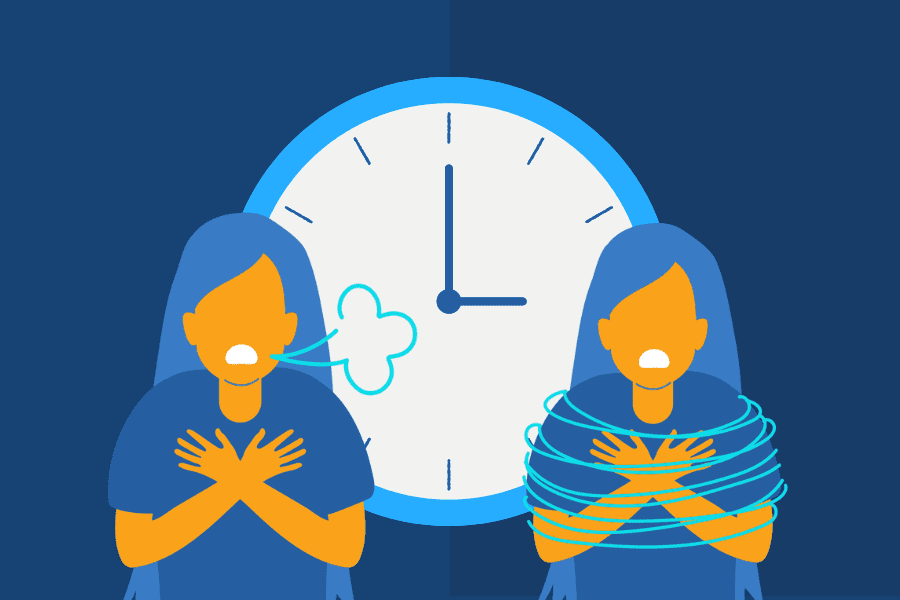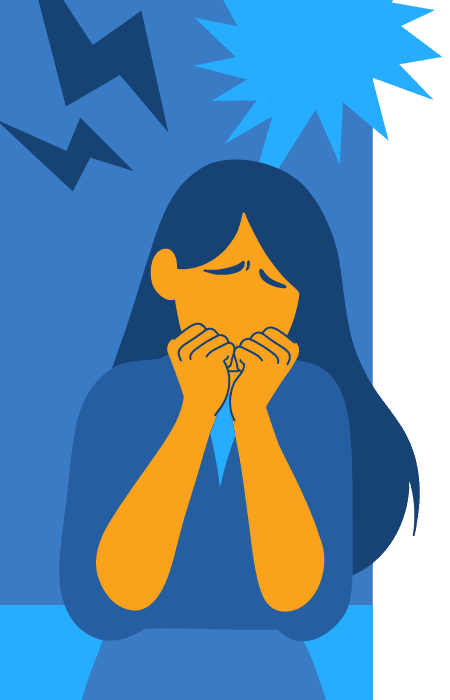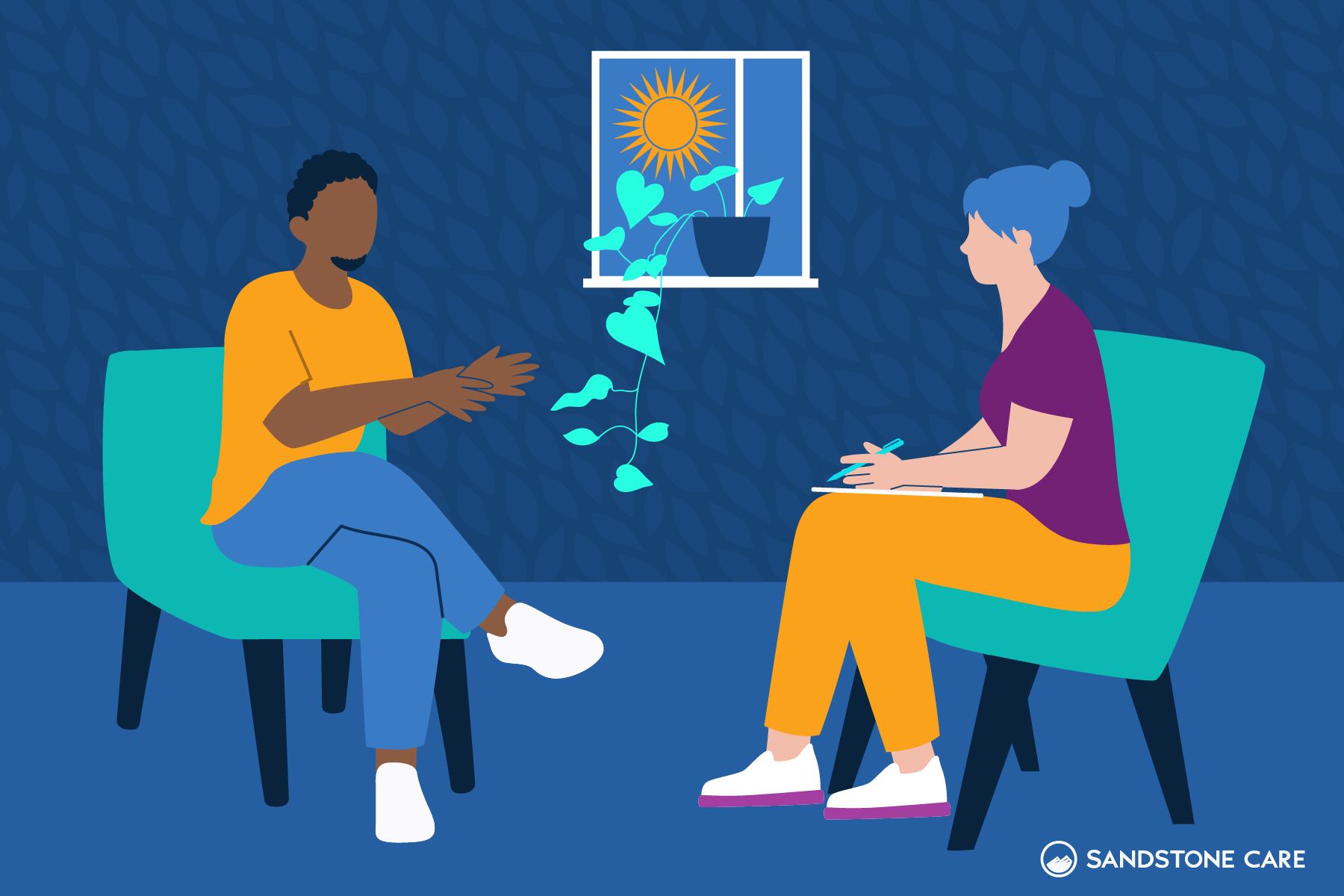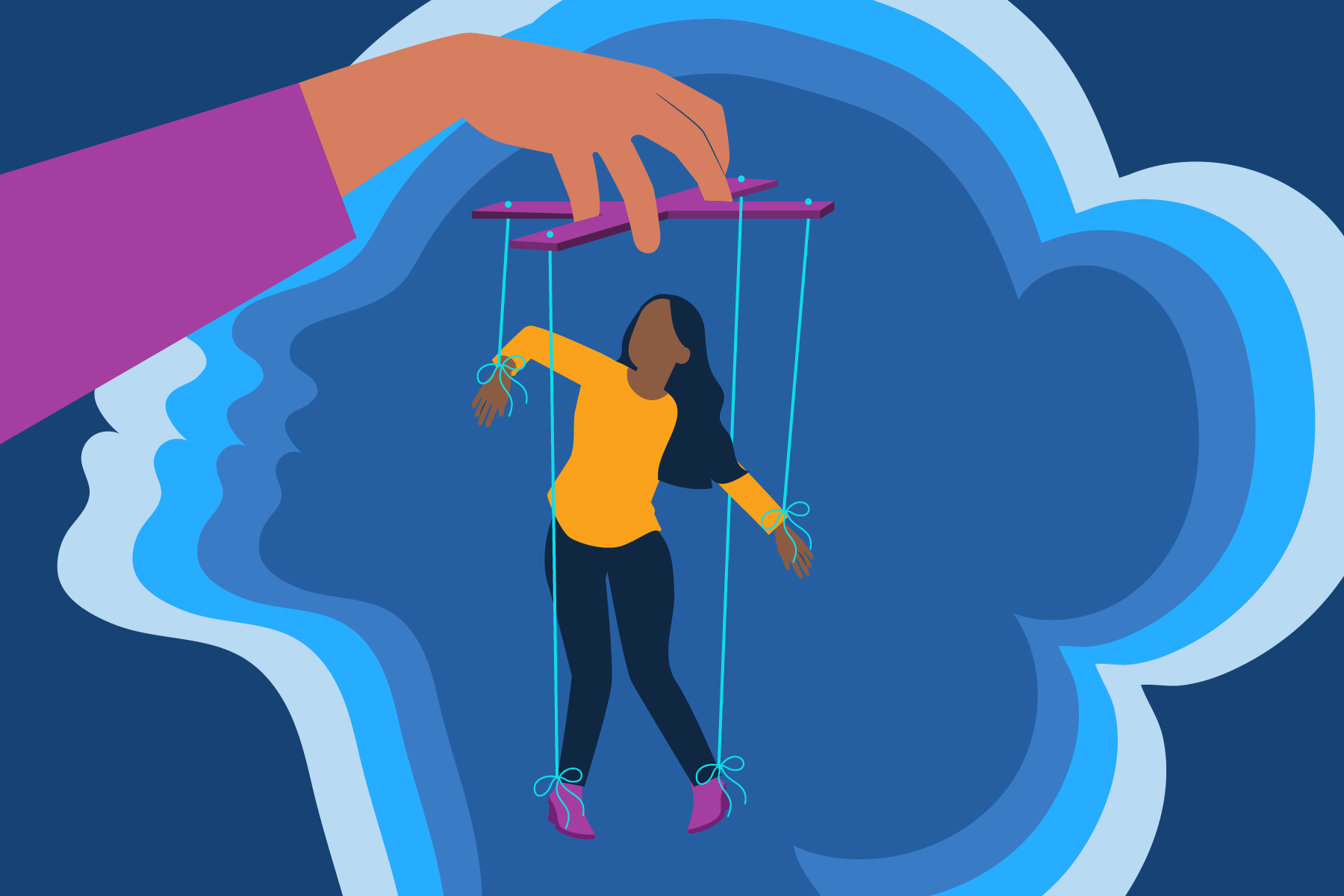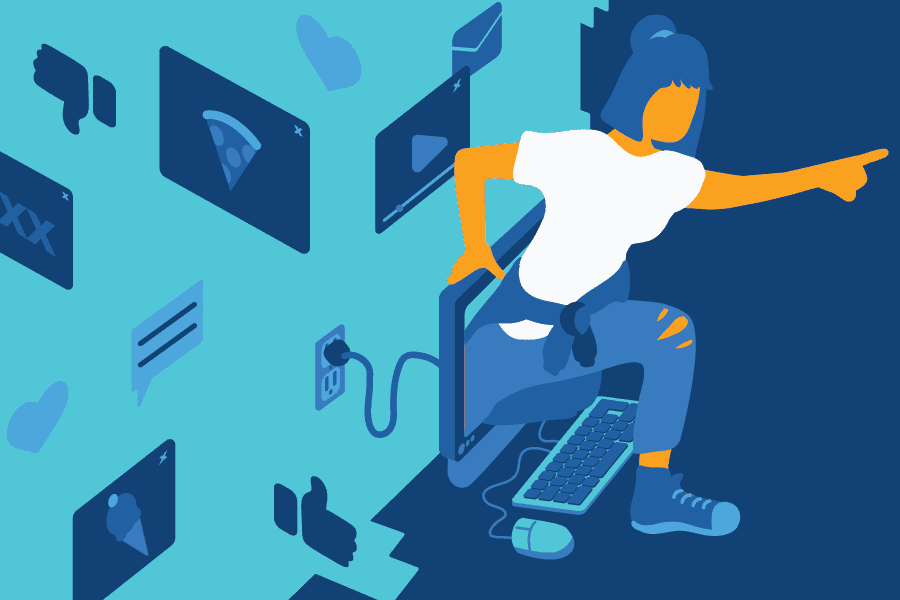Panic Attack vs. Anxiety Attack
What Is A Panic Attack?
A panic attack is a sudden fear, discomfort, or a sense of losing control.
Panic attacks can occur at any time and can be as frequent as several times a day or a few times a year.
People with panic disorder experience unexpected, sudden, and frequent panic attacks.
When panic disorder goes untreated, it can make daily life and responsibilities very difficult. However, panic disorder is treatable, and there are ways to help cope with and manage panic attacks.
What Is An Anxiety Attack?
A person experiencing an anxiety attack will experience feelings of worry, fear, and distress.
Anxiety attacks are not clinically recognized in the DSM-5. However, it does acknowledge anxiety as a symptom of various mental health disorders, including:
- Generalized anxiety disorder
- Separation anxiety disorder
- Social anxiety disorder
- Agoraphobia
- Panic disorder
- Post-traumatic stress disorder (PTSD)
- Obsessive-compulsive disorder (OCD)
- Phobias
Because anxiety attacks are not diagnosed, the signs and symptoms can be interpreted differently from person to person.
However, anxiety attacks often occur as a response to specific triggers or stressors and can build up over time.
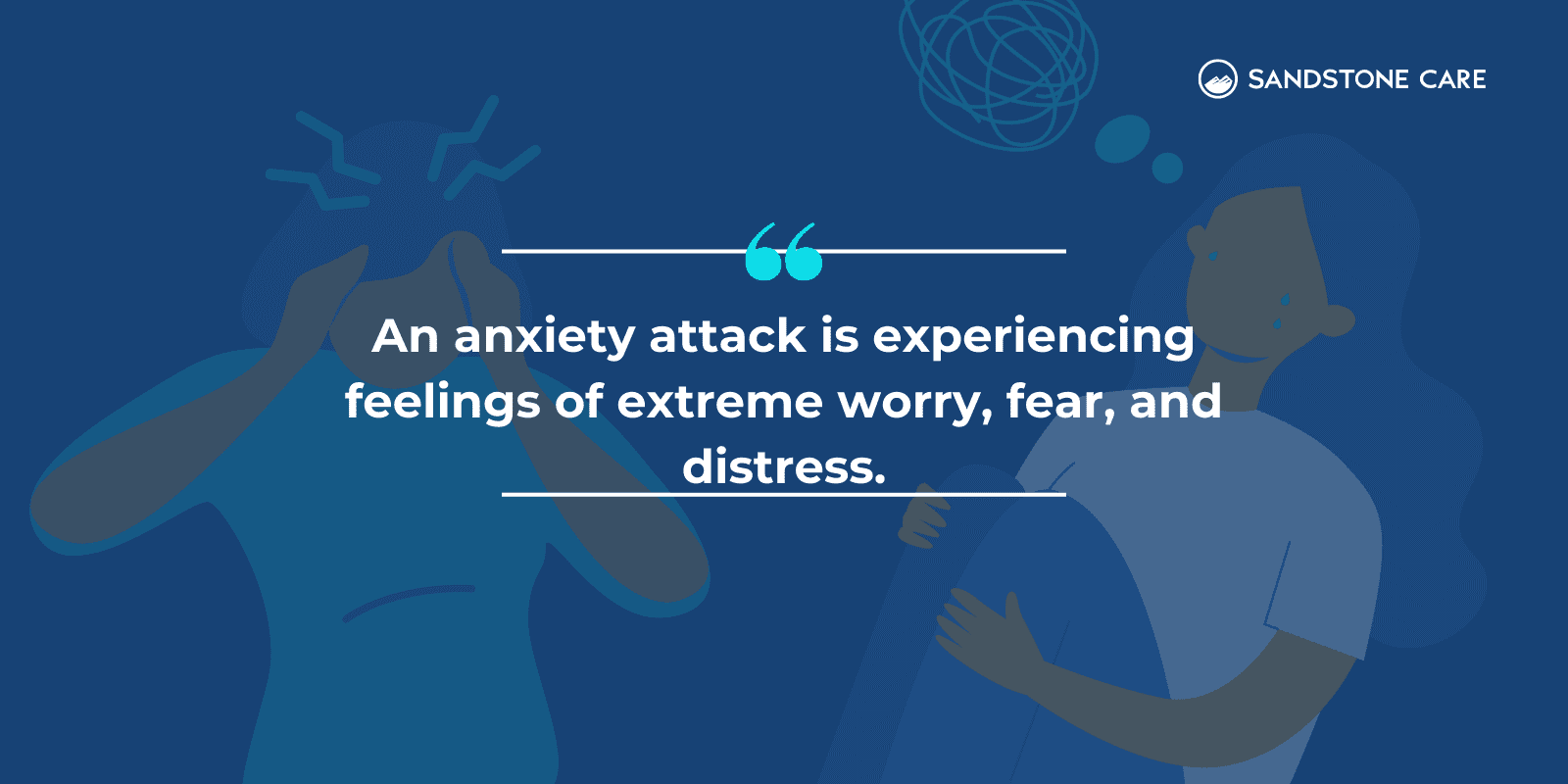
How Do I Know If I’m Having A Panic Or Anxiety Attack?
Both panic and anxiety attacks can cause distressing and uncomfortable feelings.
Some people refer to anxiety attacks and panic attacks as the same thing, but they are different conditions.
A panic attack occurs suddenly and involves intense fear. A person may experience physical symptoms that can include a fast heartbeat, shortness of breath, or tightness in the throat.
They may also have a fear of dying or losing control.
Anxiety attacks share similar symptoms but are usually caused by anticipating a stressful situation or experience.
What Is An Example Of A Panic Attack Vs. An Anxiety Attack?
An example of an anxiety attack could be when someone knows they must go up in front of a group of people and talk.
This event might cause anxiety or worry to gradually increase as they approach the situation.
With a panic attack, a person may have recently been experiencing stress at work, school, or home.
As they go about their daily routine, get home, eat dinner, and get ready for bed, they may suddenly feel overwhelmed with distressing feelings.
They may feel their heart rate increase out of nowhere, feel out of breath, and start to shake. They may begin to fear that they will die or that they are losing control over everything.
The difference between the two is that with an anxiety attack, there was a definitive trigger, and it came on gradually. A panic attack it occurred suddenly and unexpectedly without a specific trigger.
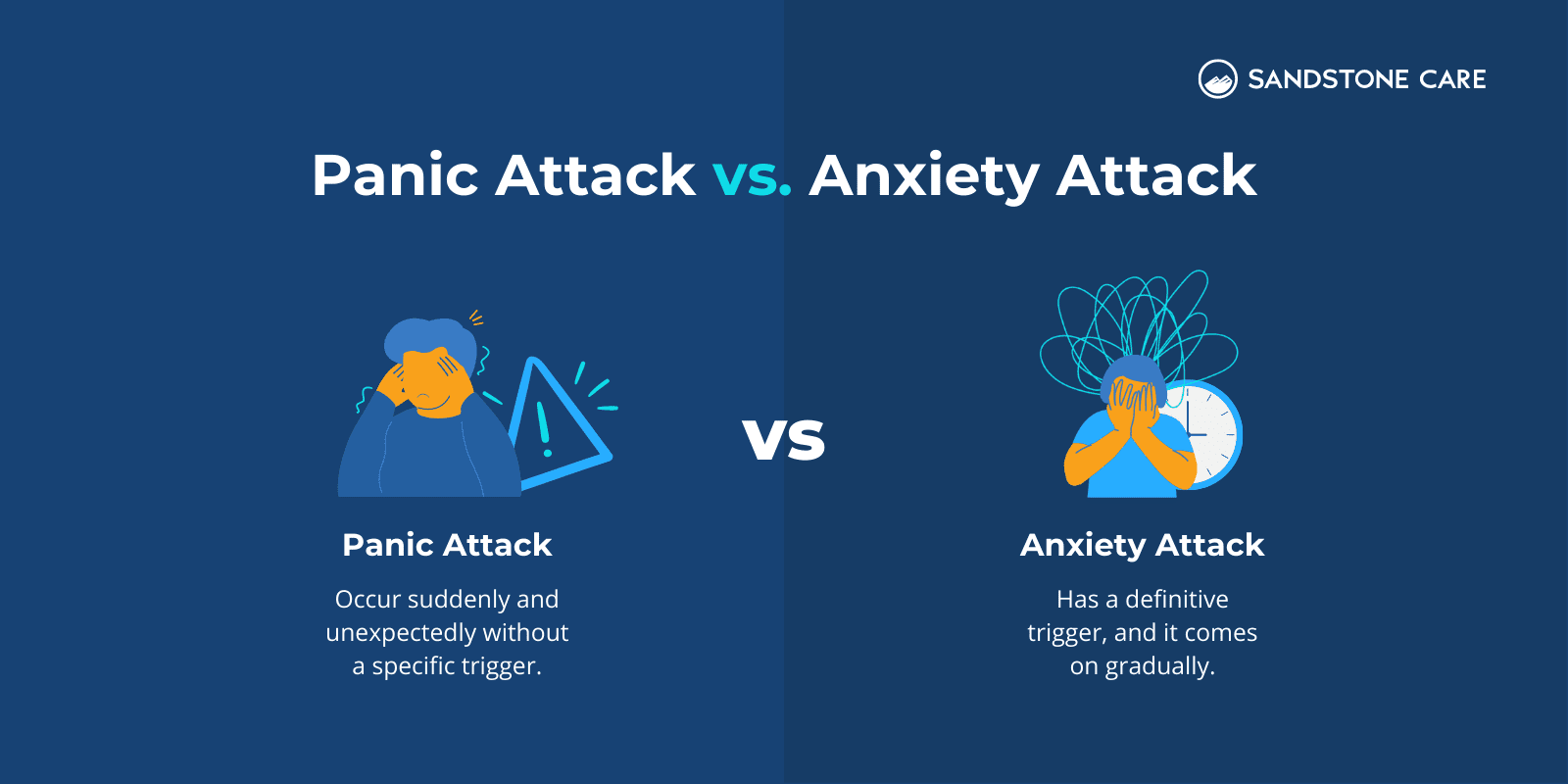
Can You Have A Panic Attack And An Anxiety Attack At The Same Time?
Yes, a person can have an anxiety attack and a panic attack at the same time.
Sometimes when a person’s anxiety worsens, it can develop into a panic attack.
Who Is More Susceptible To A Panic Or Anxiety Attack?
A person is more at risk for panic attacks if they have:
- Family history of panic attacks
- Mental health issues such as depression, anxiety, or bipolar disorder
- Chronic medical conditions, like thyroid disease
- Challenges with substance use
- Stressful life experiences
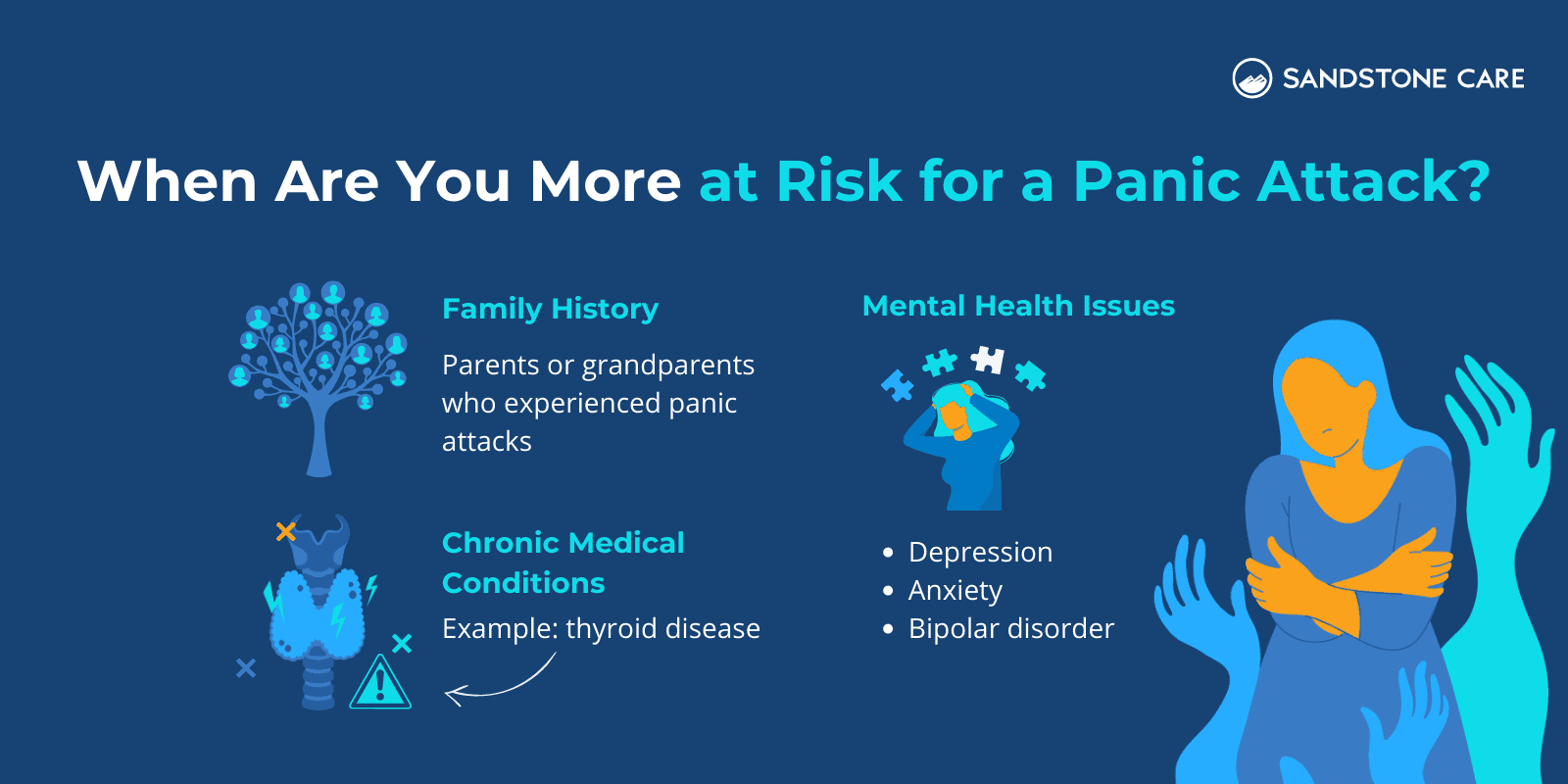
Anxiety Attack Vs. Panic Attack Symptoms
What Are The Symptoms Of An Anxiety Attack?
Physical symptoms of an anxiety attack can include:
- Increased heart rate
- Fast breathing
- Sweating
- Trembling or shaking
- Dry mouth
- Tightness in the throat
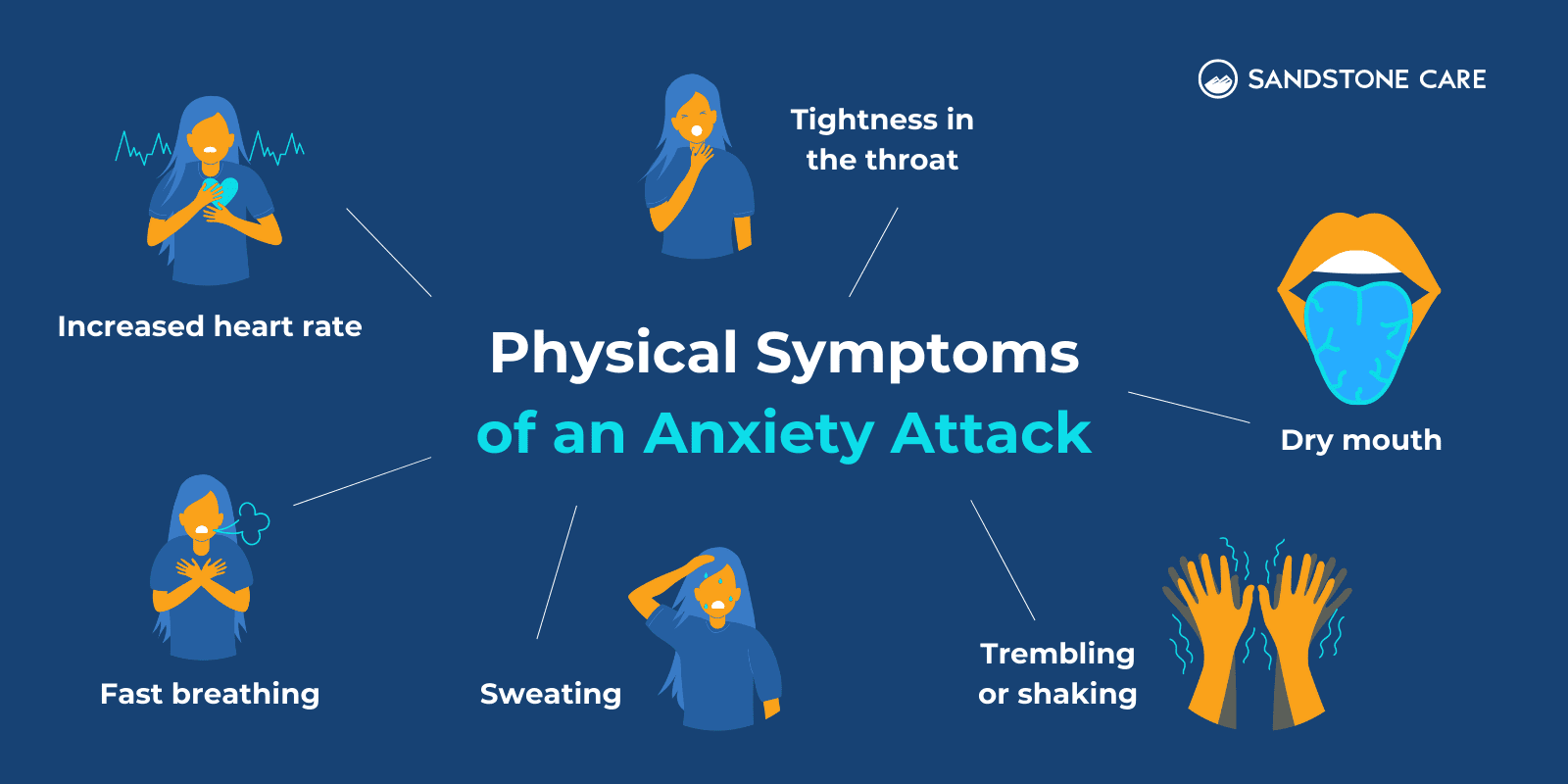
Cognitive symptoms of an anxiety attack can involve:
- Difficulty concentrating
- Problems sleeping
Emotional symptoms of anxiety attacks can include:
- Nervousness
- Irritability
- Fear
- Distress
- Uneasiness
What Are The Symptoms Of A Panic Attack?
Physical symptoms of a panic attack can include:
- Increased heart rate
- Chest pain
- Dizziness
- Hot flashes
- Chills
- Nausea or vomiting
- Numbness in the legs and arms
- Shortness of breath
- Stomach pain
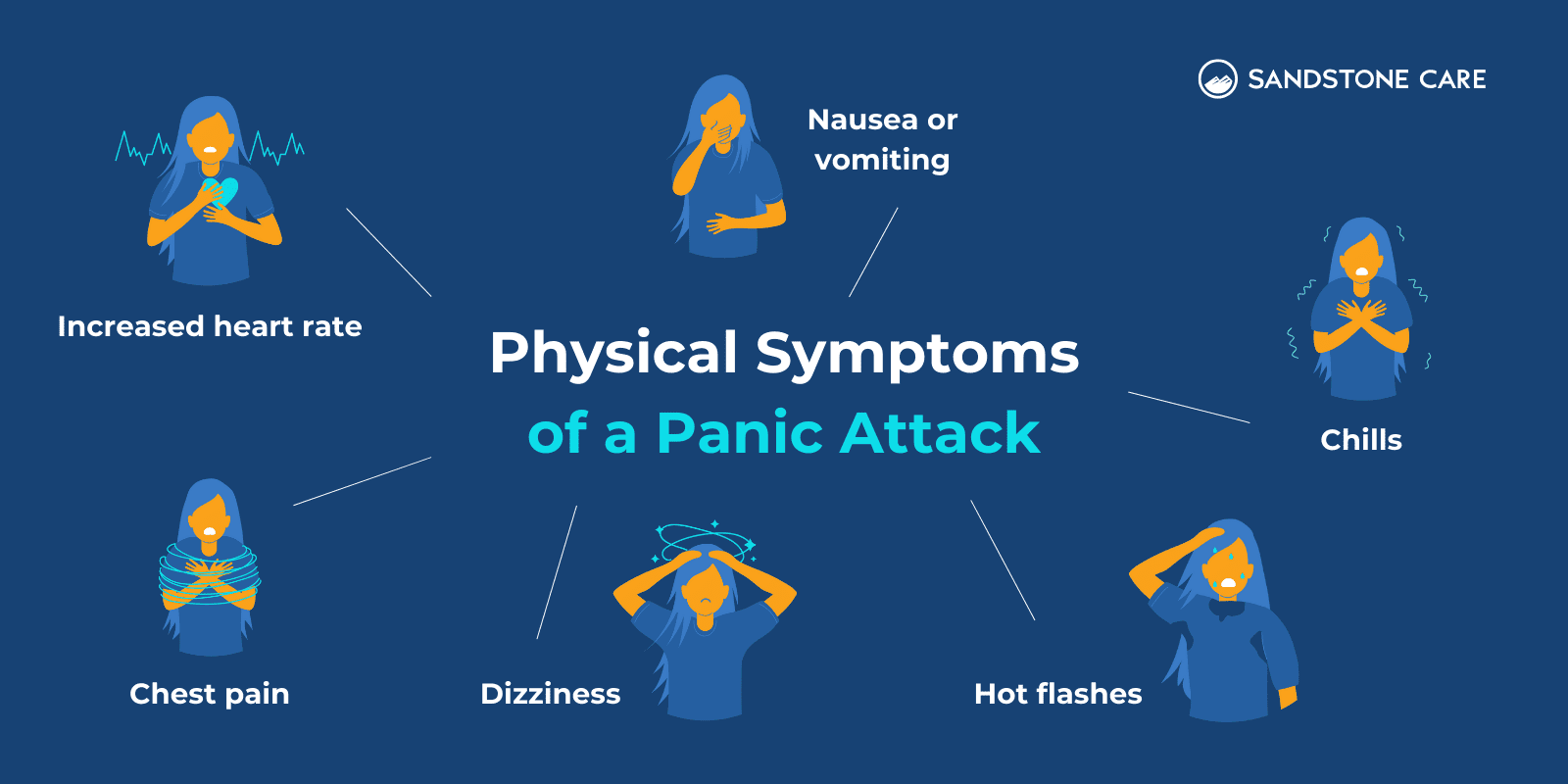
Cognitive and emotional symptoms of a panic attack can also include:
- Feeling a loss of control
- Sudden fear of dying
- Feeling detached from their body or their surroundings
What Are The 4 Signs Of A Panic Attack?
4 common signs of a panic attack can include:
- Sudden feelings of worry and fear
- Feeling a loss of control or fear of dying
- Experiencing physical symptoms like increased heart rate, fast breathing, or shaking
- Feeling detached from yourself or the world around you
If you or a loved one are experiencing the signs and symptoms of a panic attack, reach out for help and talk to a mental health professional.
When Should You Be Concerned About Your Anxiety?
When a person feels that their anxiety is affecting their everyday life, they should seek professional help.
Other signs that it may be time to get help for your anxiety can also include:
- Feeling that you cannot control your worries
- Isolating yourself
- Losing interest in things you used to once love
If you are concerned about your anxiety, reach out to someone you trust and connect to professional help.

Is this blog hitting close to home?
We’re here to help.
What Do Silent Panic Attacks Feel Like?
A silent panic attack includes internal symptoms like fear of loss of control, chest pain, shaking, dizziness, difficulty breathing, increased heart rate, lightheadedness, numbness of extremities, nausea, feelings of detachment, and/or hot flashes. However, they do not come with external symptoms making it difficult for others to recognize the attack.
For example, a person experiencing a silent panic attack may feel their heart rate increase or become dizzy, but it may not seem like they are going through anything on the outside.
How Long Does An Anxiety Attack Last?
Anxiety attacks usually last between a few minutes to half an hour.
Anxiety attacks also tend to occur gradually.
How Long Does A Panic Attack Last?
A panic attack can range from a few minutes to several hours.
Panic attacks are usually sudden and unexpected and feel like an overwhelming rush of distressing feelings.
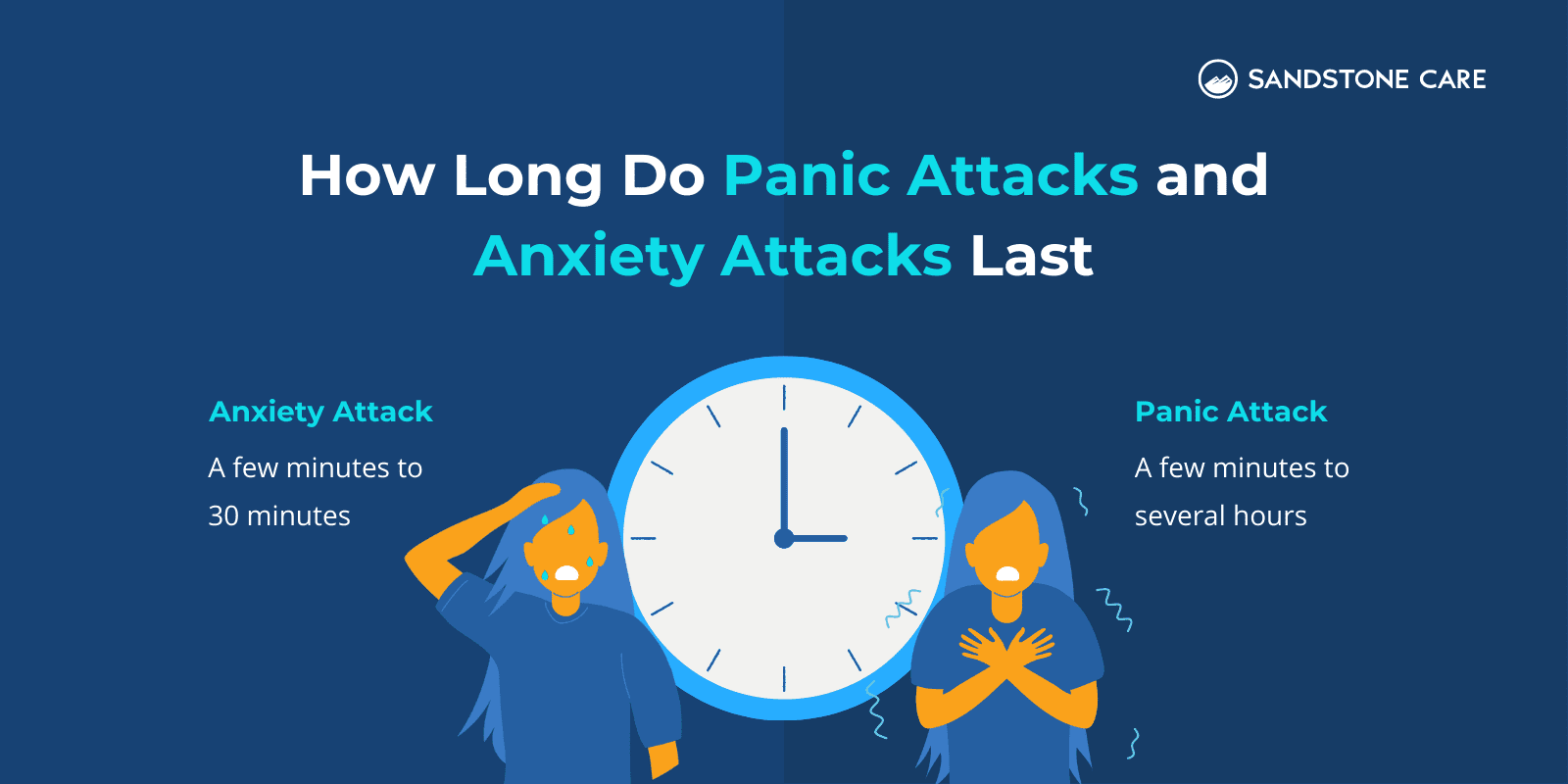
Anxiety Attack vs. Panic Attack Difference
What Is The Difference Between A Panic Attack And An Anxiety Attack?
Panic and anxiety attacks share similar symptoms but are two different things.
Panic attacks are usually more intense than anxiety attacks and can last longer. They are also recognized by the DSM-5, whereas anxiety attacks are not.
Additionally, panic attacks can occur with or without a trigger, while anxiety attacks are responses to a trigger. Also, panic attacks are sudden and unexpected, while anxiety attacks tend to occur gradually.
What Are The Causes Of Anxiety Attacks & Panic Attacks?
Anxiety attacks and panic attacks often have similar triggers.
The causes of anxiety attacks and panic attacks can include:
- Stressful environments
- Drug or alcohol withdrawal
- Chronic conditions
- Medications
- Exposure to trauma triggers
- Overuse of stimulants, including caffeine
Identifying the root cause of the anxiety or panic attack is important to find the best treatment.
Sometimes, it can be hard to tell what the exact cause of a panic attack is because they come on unexpectedly.
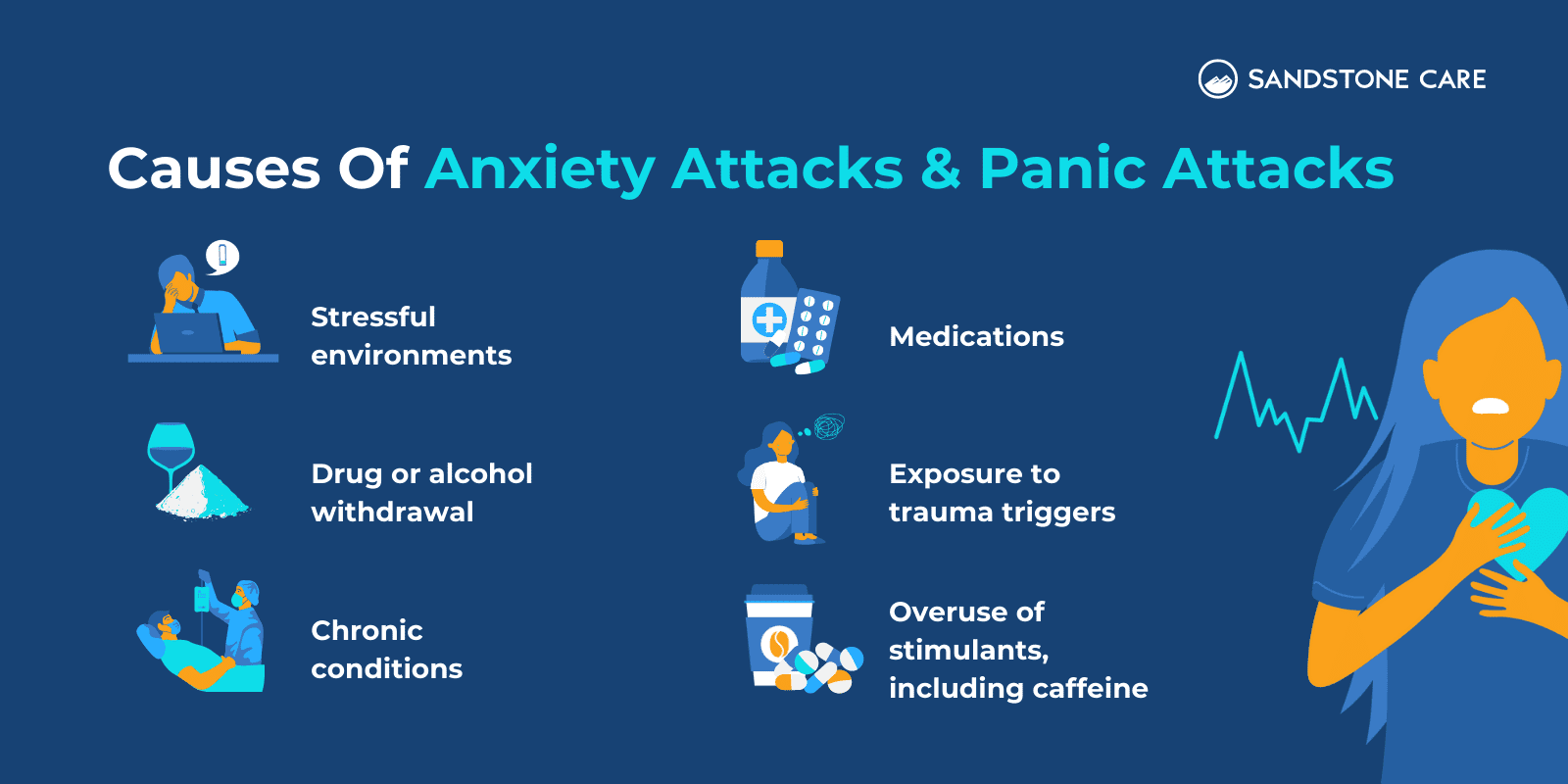
What Triggers An Anxiety Attack Vs. A Panic Attack?
One of the key differences between panic attacks and anxiety attacks is that panic attacks can come with or without a trigger, and anxiety attacks are usually a response to a perceived threat.
Because of this, it can be hard to identify what is triggering a panic attack, whereas anxiety attacks have more definitive triggers.
Common triggers for both anxiety attacks can involve:
- Financial stress
- Job changes
- Speaking in front of crowds
- Loss of a loved one
- Stress related to work
- Conflict in relationships
- School stress
How Do Our Bodies Decide Which Response To Have?
When a person’s body is faced with perceived danger or stress, the “fight-or-flight” response is triggered.
A panic attack is believed to occur when this response is triggered, but there is no apparent danger.
This response activates the sympathetic nervous system through a sudden release of hormones, and then when the threat is gone, the body returns to its normal levels after about 30 to 60 minutes.
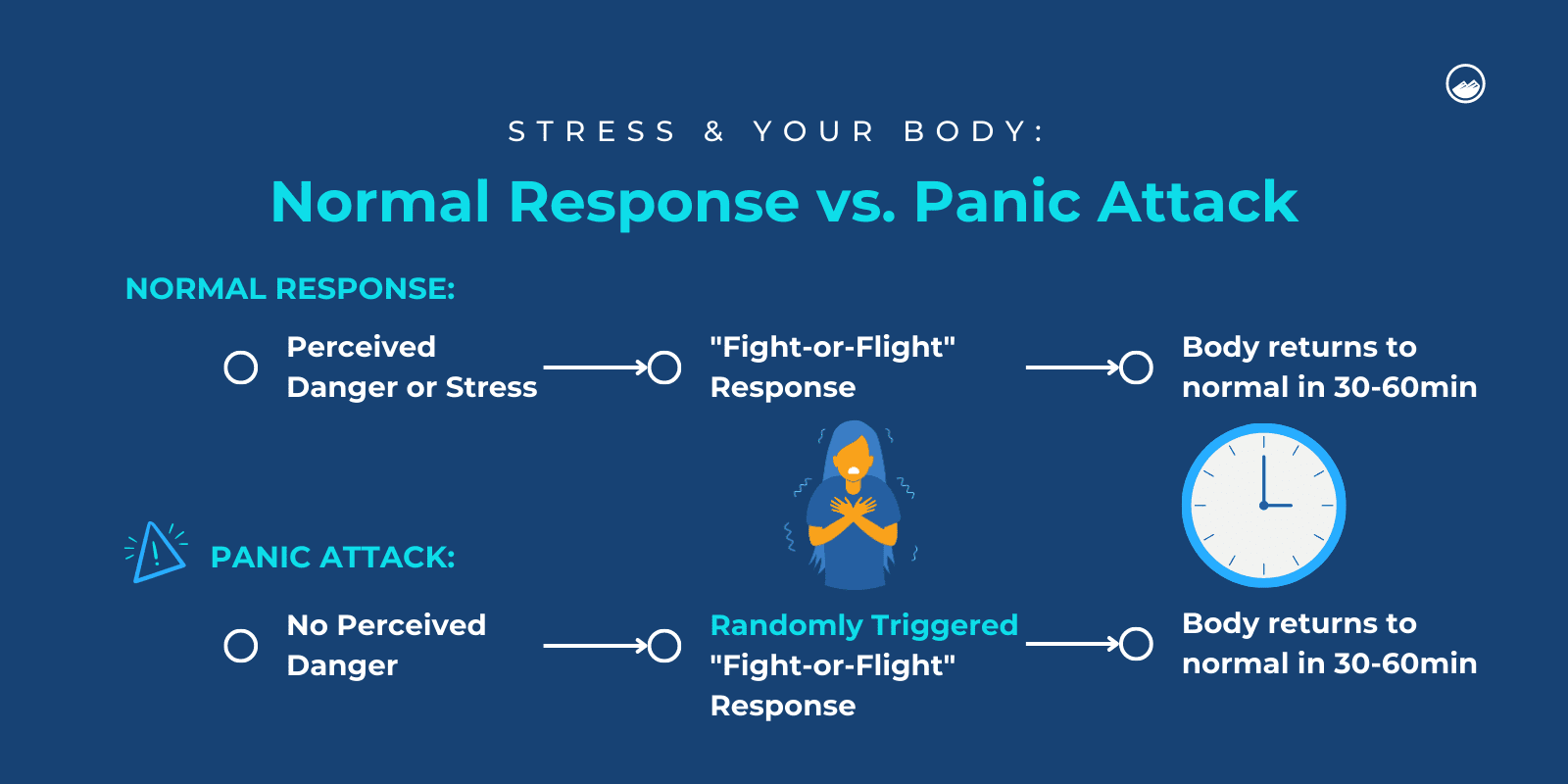
Can Anxiety Trigger Panic?
Anxiety disorders often involve distressing feelings, including fear, worry, and panic.
A person with an anxiety disorder may experience panic attacks.
This is one of the reasons why seeking help to identify the underlying cause of panic attacks is important so that a person can receive proper treatment.
Detection & Diagnosis
How Do You Figure Out What Triggers Panic Attacks?
Triggers for panic attacks can vary from person to person, but common triggers can include:
- Financial stress
- Medication
- Substance use
- Family or relationship conflict
- Experiencing trauma
- Nutritional deficiencies
- High–stress levels
Substance use and addiction affect a person’s physical and mental health. A lot of times, people may turn to substances as an unhealthy way to cope with difficult feelings and situations, but it only makes the matter worse over time.
Seeking professional help and working with a therapist can help a person identify triggers and learn how to cope with them healthily.
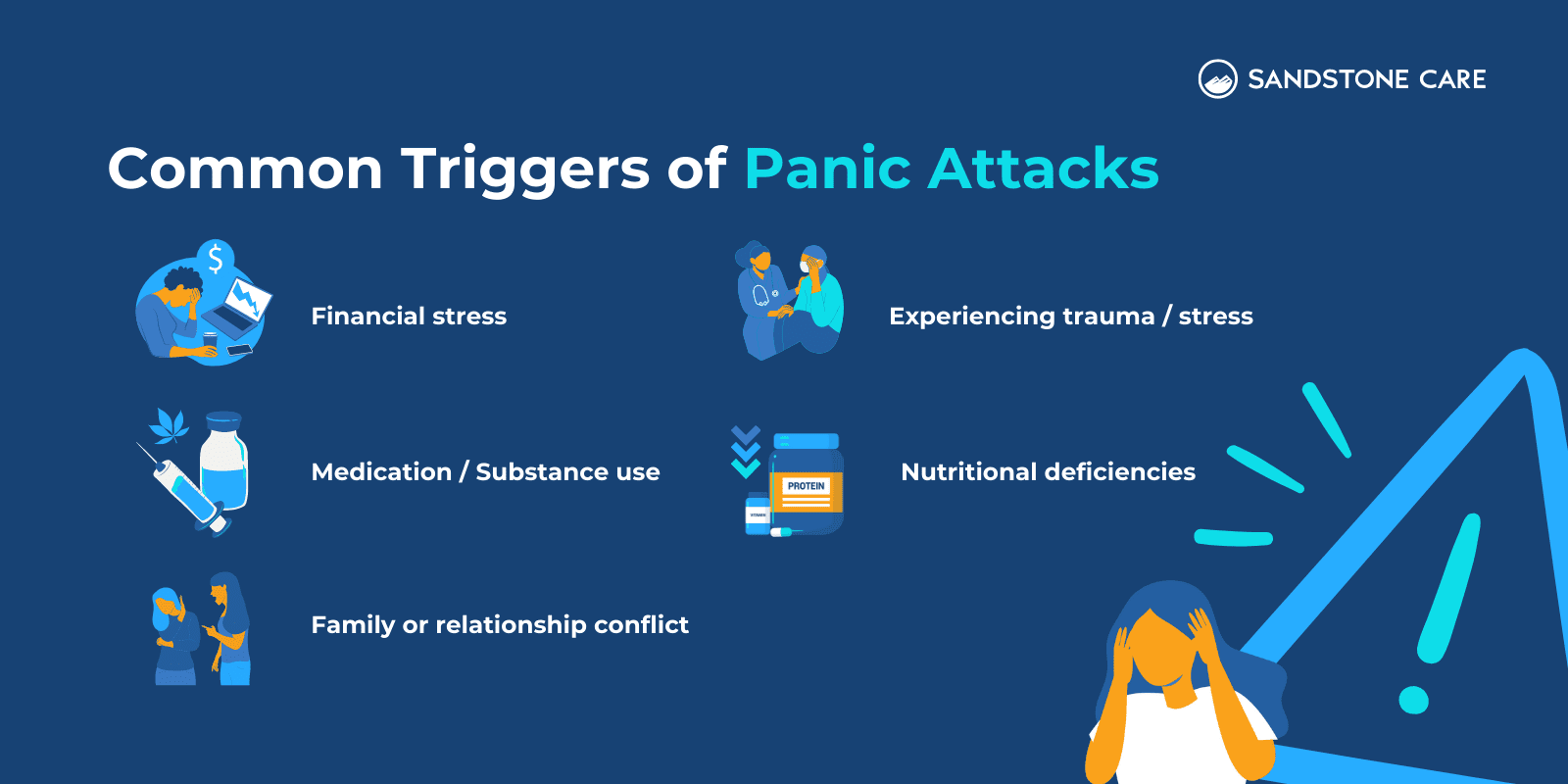
Can Blood Test Detect Panic Attacks?
A blood test doesn’t detect panic attacks but can help rule out heart attacks or other conditions.
If you are experiencing panic attacks, a healthcare provider will probably do a blood test to help eliminate other possible causes.
Why Am I Suddenly Having Panic Attacks?
Panic attacks come unexpectedly and suddenly.
Some triggers may not be as obvious as others.
For example, a person may be going through a long period of stress and find themselves suddenly experiencing panic attacks when they rarely did before.
At the moment, it may feel that the panic attacks came out of nowhere, but after looking back, a person may begin to recognize that they had been under great amounts of stress, which put a strain on their mental health.
If you suddenly have panic attacks, it is important to seek help to identify the root of the problem.
When panic disorder goes untreated, panic attacks can impact a person’s day-to-day life and make it hard to keep up with everyday responsibilities.
How Can You Diagnose Anxiety And Panic Attacks?
A doctor or mental health professional can diagnose a panic disorder, panic attack, or anxiety disorder based on the Diagnostic and Statistical Manual of Mental Disorders (DSM-5) definitions.
Anxiety attacks cannot be diagnosed because they are not clinically defined in the DSM-5, but a mental health professional can identify and diagnose symptoms of an anxiety disorder.
To diagnose anxiety disorders, panic disorders, or panic attacks, a doctor will go over symptoms and life events, along with a psychological examination, physical examination, blood tests, and heart tests.
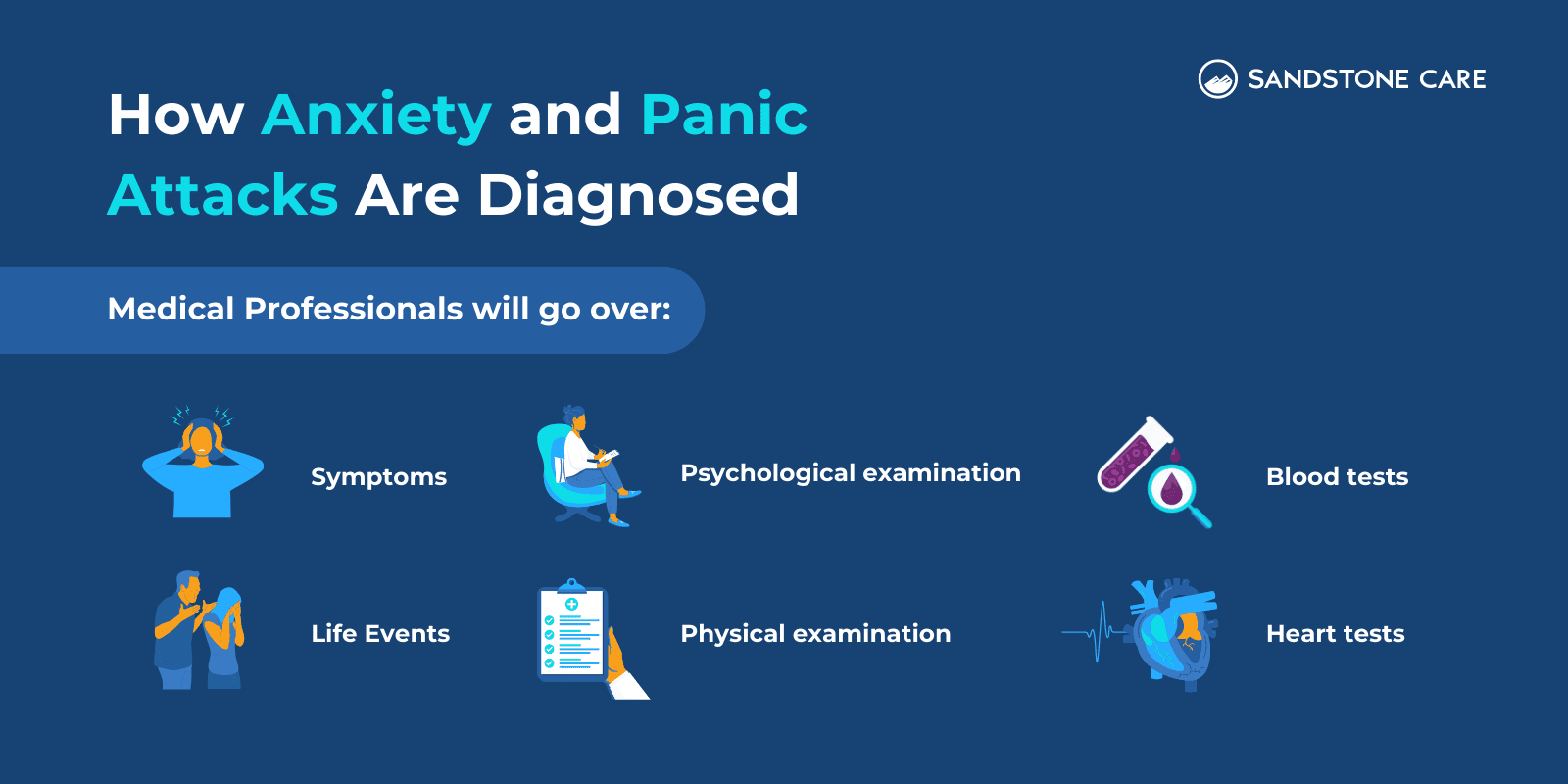
Anxiety Attack Vs. Panic Attack Treatment
Can The Doctor Give You Anything For Panic Attacks?
A doctor may prescribe medications to help manage symptoms of panic disorder.
Common medications that are prescribed include:
- Selective serotonin reuptake inhibitors (SSRIs)
- Serotonin and norepinephrine reuptake inhibitors (SNRIs)
- Benzodiazepines
Beta-blockers are medications that can help manage some of the physical symptoms of panic disorder but are not commonly prescribed by health care providers.
What Is The Best Treatment For Anxiety Attacks?
Talk therapy, like cognitive behavioral therapy (CBT), can help people with anxiety disorder manage their symptoms.
Mental health professionals do not diagnose anxiety attacks themselves, but if a person is experiencing anxiety attacks, talk therapy can help them understand the root cause of the problem and address it.
For some people, medications like benzodiazepines can effectively manage anxiety disorder symptoms.
What Is The Best Treatment For Panic Attacks?
Psychotherapy, also known as talk therapy, is a common and effective treatment for panic disorder and panic attacks.
Psychotherapy can help a person understand and identify their triggers and learn how to restructure their negative thoughts and feelings.
Talk therapy can also help teach a person healthy coping skills for managing symptoms of panic disorder and panic attacks.
Cognitive behavioral therapy (CBT) is a common form of psychotherapy that is used to treat panic disorder and can help a person learn different ways of thinking and reacting to the feelings that happen before and during a panic attack.
Additionally, exposure therapy is a CBT method that involves confronting the fears and beliefs that may be associated with panic disorder and helps a person cope and restructure these beliefs.
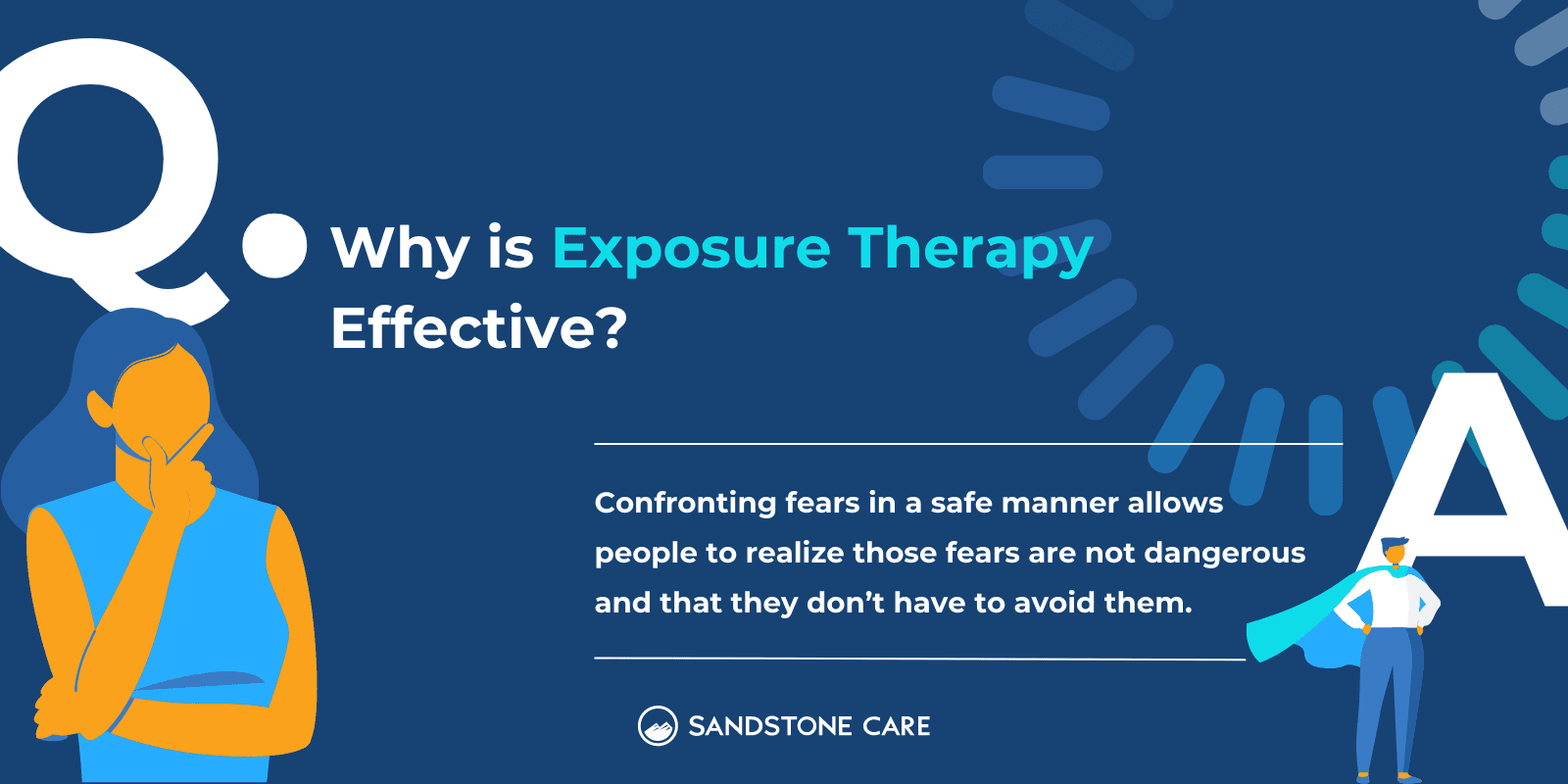
What Medication Helps With Panic And Anxiety Attacks?
Selective Serotonin Reuptake Inhibitors (SSRIs) are an FDA-approved medication for panic disorder.
Common SSRIs include fluoxetine, paroxetine, and sertraline.
Benzodiazepines are also a medication used to treat generalized anxiety disorder, panic disorder, and seizures.
Should You Go To The ER For Panic Attacks?
Not every panic attack requires immediate medical attention.
However, if you or a loved one are experiencing severe symptoms, cannot control them, or feel that it is getting worse, you should seek help.
If you believe someone may be experiencing a heart attack or are in danger, call 911.
When Should You Seek Medical Attention For Anxiety?
A person should seek medical attention if their symptoms are worsening and getting out of control.
Additionally, if anxiety has had a negative impact on your daily life, it is a sign that you should seek professional help.
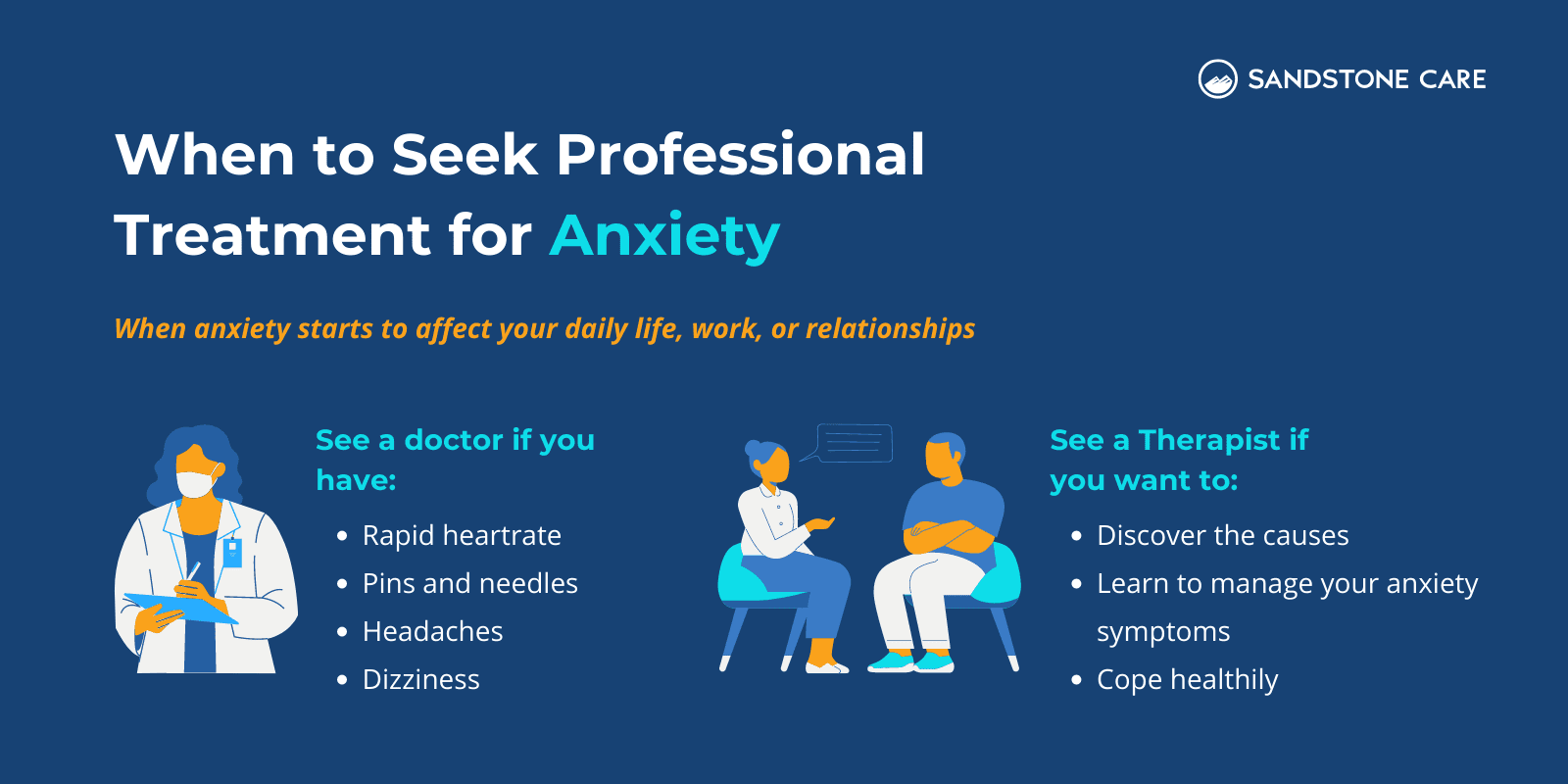
What Will The ER Do For Anxiety?
The ER can help a person manage symptoms through breathing techniques and, sometimes, with medication.
Coping Skills for Anxiety & Panic Attacks
There are coping skills that can help a person get through an anxiety or panic attack.
A big part of therapy for anxiety disorder and panic disorder is learning healthy ways to cope with difficult feelings and situations.
These skills and techniques can include:
- Identifying and acknowledging
- Symptoms of an anxiety or panic attack can feel very difficult to cope with, but identifying your triggers and acknowledging the situation can help a person understand that the symptoms are only temporary.
- Breathing techniques
- One of the most common symptoms that anxiety attacks and panic attacks share is problems breathing. Learning ways to manage and control breathing can help calm a person down.
- Relaxation
- Certain relaxation techniques, like guided imagery or muscle relaxation, can help reduce feelings that come with panic and anxiety.
- Mindfulness
- Practicing mindfulness is about being in the present moment. Meditation often involves mindfulness, and it can be especially helpful for individuals with anxiety who tend to worry about the future.
FAQ
You have questions. We have answers.
Our goal is to provide the most helpful information. Please reach out to us if you have any additional questions. We are here to help in any way we can.
According to The Primary Care Companion To The Journal Of Clinical Psychiatry, panic attacks can cause symptoms like chest pain and may be related to cardiovascular issues in some cases.
Panic attacks may be seen on an Electrocardiogram or an EKG because they can cause an increase in a person’s heart rate.
An ER doctor can help a person go through breathing exercises to get some of the symptoms under control, and if necessary, they may prescribe anti-anxiety medication.
While it is rare, it is possible for a panic attack to cause a heart attack.
If you think a person may be experiencing a heart attack from a panic attack, call 911.


Let’s take the next steps together
Panic attacks and anxiety attacks can both cause symptoms that involve fear, worry, and distress. It is important to address the underlying cause. Sandstone Care is here to support teens and young adults with mental health and substance use disorders.

